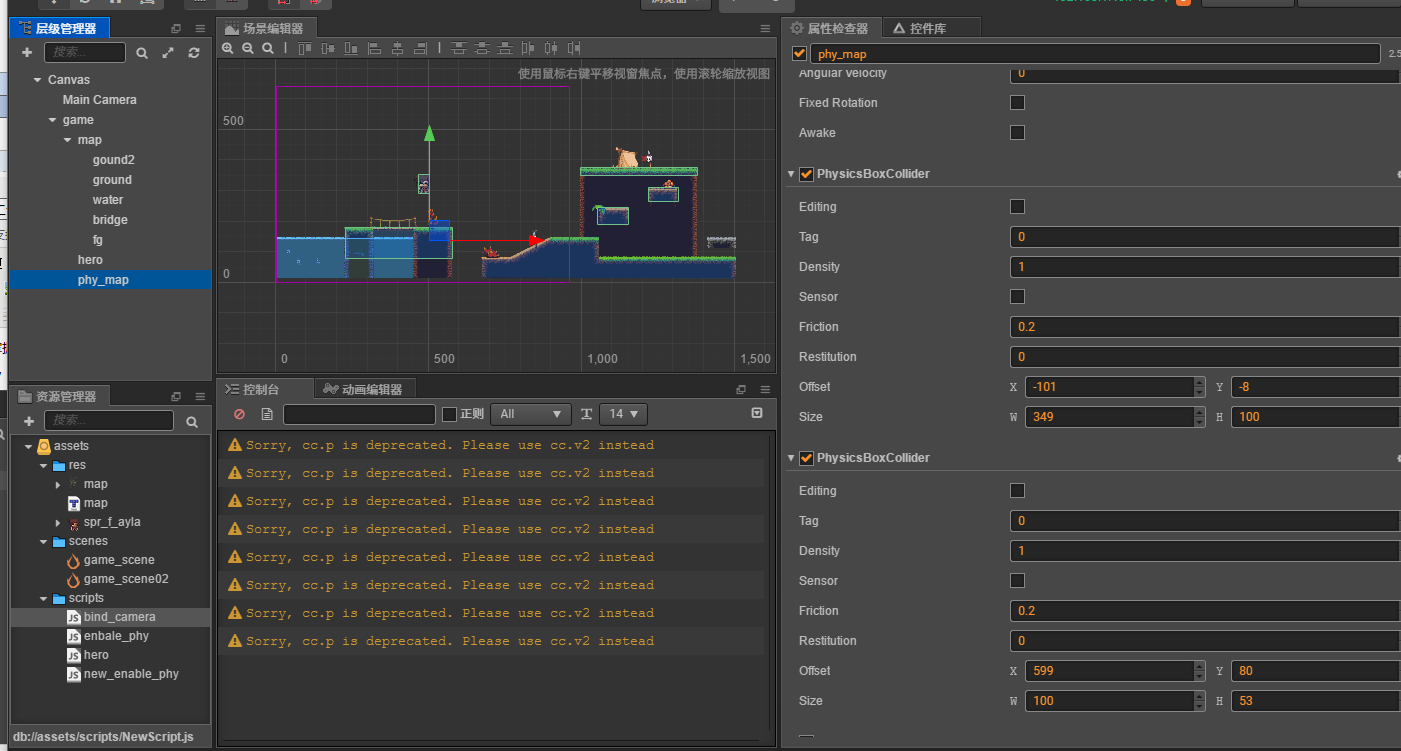1: 完成课堂案例,掌握物理引擎的基本使用;
2: 了解Camera组件,完成Camera跟随玩家;


官方物理引擎案例
1: 准备好tiled地图;
2: 为tiled地图编辑好物理碰撞器;
3: 放出角色,为角色编辑好物理碰撞器;
4: 监听键盘消息:
cc.systemEvent.on(cc.SystemEvent.EventType.KEY_DOWN, this.on_key_down.bind(this), this);
cc.systemEvent.on(cc.SystemEvent.EventType.KEY_UP, this.on_key_up.bind(this), this);
5: 设置角色的水平和竖直速度; 竖直600,水平400
6: 设置cc.Camera组件,设置Camera跟谁玩家;
开启物理引擎和debug模式脚本enable_phy.js
cc.Class({ extends: cc.Component, properties: { // foo: { // default: null, // The default value will be used only when the component attaching // to a node for the first time // url: cc.Texture2D, // optional, default is typeof default // serializable: true, // optional, default is true // visible: true, // optional, default is true // displayName: 'Foo', // optional // readonly: false, // optional, default is false // }, // ... is_debug: false, // 是否显示调试信息; // 重力加速度是一个向量, 有方向的,2D, Vec重力加速度的大小; gravity: cc.p(0, -320), // 系统默认的 }, // use this for initialization onLoad: function () { // 游戏引擎的总控制 // cc.Director, cc.director 区别呢? // 大写的cc.Director是一个类, 小写cc.direcotr全局的实例 cc.director.getPhysicsManager().enabled = true; // 开启了物理引擎 // 独立的形状,打开一个调试区域,游戏图像的,逻辑区域; // 开始调试模式: if (this.is_debug) { // 开启调试信息 var Bits = cc.PhysicsManager.DrawBits; // 这个是我们要显示的类型 cc.director.getPhysicsManager().debugDrawFlags = Bits.e_jointBit | Bits.e_shapeBit; } else { // 关闭调试信息 cc.director.getPhysicsManager().debugDrawFlags = 0; } // 重力加速度的配置 cc.director.getPhysicsManager().gravity = this.gravity; }, // called every frame, uncomment this function to activate update callback // update: function (dt) { // }, });
主角逻辑hero.js
cc.Class({ extends: cc.Component, properties: { }, // LIFE-CYCLE CALLBACKS: onLoad() { this.body = this.node.getComponent(cc.RigidBody); cc.systemEvent.on(cc.SystemEvent.EventType.KEY_DOWN, this.on_key_down.bind(this), this); cc.systemEvent.on(cc.SystemEvent.EventType.KEY_UP, this.on_key_up.bind(this), this); this.input_flag = 0; }, start() { }, jump: function() { var v = this.body.linearVelocity; v.y = 200; this.body.linearVelocity = v; }, walk: function(dir) { // dir -1 左 1右 var v = this.body.linearVelocity; v.x = dir * 200; this.body.linearVelocity = v; this.node.scaleX = dir; // 修改scaleX 1 或者-1实现横坐标镜像翻转 }, on_key_down: function(e) { console.log(e); switch (e.keyCode) { case cc.macro.KEY.a: this.input_flag = -1; break; case cc.macro.KEY.d: this.input_flag = 1; break; case cc.macro.KEY.w: this.jump(); break; } }, on_key_up: function(e) { switch (e.keyCode) { case cc.macro.KEY.a: this.input_flag = 0; break; case cc.macro.KEY.d: this.input_flag = 0; break; case cc.macro.KEY.w: break; } }, update(dt) { if (this.input_flag !== 0) { // 注意一下 != !==对于0和1判断的区别 this.walk(this.input_flag); } }, });
cc.Camera组件
1: 配置哪些物体受Camera组件影响;
Targets: 受Camera影响的物体的集合;
2: 配置Camera跟随目标:
var w_pos = this.target.convertToWorldSpaceAR(cc.p(0, 0));
var pos = this.node.parent.convertToNodeSpaceAR(w_pos);
摄像机和角色绑定,跟随移动bind_camera.js
cc.Class({ extends: cc.Component, properties: { target: { default: null, type: cc.Node } }, // LIFE-CYCLE CALLBACKS: // onLoad () {}, start() { }, update(dt) { // target到哪里,camera就到哪里 /** * 1、target坐标转换成世界坐标 * 2、target的世界坐标转化为camera父节点的坐标系下 * 3、设置camera坐标 */ var wpos = this.target.convertToWorldSpaceAR(cc.v2(0, 0)); var pos = this.node.parent.convertToNodeSpaceAR(wpos); // this.node.setPosition(pos); this.node.x = pos.x; // 此方法只移动x轴 }, });